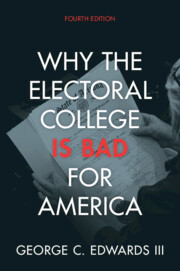Refine search
Actions for selected content:
4 results
7 - Maintaining Cohesion
-
- Book:
- Why the Electoral College Is Bad for America
- Published online:
- 09 November 2023
- Print publication:
- 23 November 2023, pp 147-177
-
- Chapter
- Export citation
9 - Conclusion
-
- Book:
- Why the Electoral College Is Bad for America
- Published online:
- 09 November 2023
- Print publication:
- 23 November 2023, pp 194-208
-
- Chapter
- Export citation
8 - Preserving the Party System
-
- Book:
- Why the Electoral College Is Bad for America
- Published online:
- 09 November 2023
- Print publication:
- 23 November 2023, pp 178-193
-
- Chapter
- Export citation

Why the Electoral College Is Bad for America
-
- Published online:
- 09 November 2023
- Print publication:
- 23 November 2023
